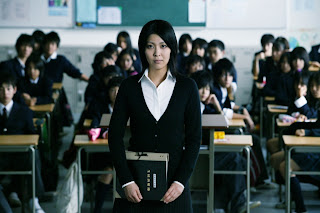Welcome back to the JFF Blog! We have been so busy in the office that it's taken a while to update here, but we promise you lots of content over the next 2 weeks as we lead up to the festival. Here we have another entry from a JFF volunteer, this time its Joseph who takes a look at the creative works of Tetsuya Nakashima.
"This year’s Japanese Film Festival brings to audiences in Sydney and Melbourne the most recent film by award-winning director Tetsuya Nakashima, Confessions. Nakashima-san adapted Confessions (Kokuhaku) from a best-selling and critically acclaimed mystery novel written by Kanae Minato. The premise is irresistible: a teacher, on the verge of retiring, confronts her class with the revelation that two students among them murdered her young daughter, triggering a slow-burn cycle of revenge and retribution. The movie moves swiftly from a whodunit, to a psychological thriller to a full-blown, heart-stopping, revenge tragedy.
Confessions will put you on the edge of your seat.
It will make you squirm.
It will affect you.
It will impress you.
"Confessions"
Confessions stars the brilliant Takako Matsu, who is also featured in Villon’s Wife, playing in this year’s festival and who some readers may have seen in K-20: Legend of the Mask at the 13th JFF. A crop of talented young actors are also cast in Confessions and Nakashima wrings incredible performances from his entire cast. The film has been submitted as Japan
Cinemagoers from previous years’ Japanese Film Festivals may recognise Nakashima as the director of other brilliant and moving features, including Memories of Matsuko (12th JFF). Matsuko, like its predecessor in Nakashima’s filmmaking oeuvre, Kamikaze Girls (10th JFF), showcased the director’s talent for merging the stark reality of gritty and confronting issues with a fairytale-like quality.
"Memories of Matsuko"
Kamikaze Girls achieved this synthesis by means of the distinctive appearances of its lead actresses, the gorgeous Kyoko Fukada (yes, here the writer betrays his bias) and Japanese-American Anna Tsuchiya, the fantastic costume designs (including fully realised rococo trappings) and mix of animation with live action storytelling. The animation featured less heavily in Memories of Matsuko, which used creative musical numbers, clever cutaways and editing, skilled lamp-shading of character tropes and elaborately stylised sets and costumes to imbue the movie with a dark fairytale quality. Then, of course, there are times when all of the stylistic cues are briefly stripped away, making the emotions and tensions onscreen suddenly hit the audience with a very visceral thud.
"Kamikaze Girls"
Confessions is a very different sort of movie. In a sense, Nakashima is playing against type, subverting the expectations of his viewers by presenting the hardboiled, emotionally exacting elements present in his previous work, without much of the overt whimsy seen therein. Nevertheless, the figurative and the fantastic which are the hallmark of Nakashima’s work find their way into Confessions by other means. Some scenes are slowed down and the point of view is inverted, making otherwise mundane events and occurrences take on a significance and importance that reminds the audience that the surreal is never far removed from the reality.
Much of the film is shot with heavily saturated light pouring through the frame, unconventionally focused, slowed down or with unusual framing devices, such as mirrors, the display on a camcorder or (I kid you not) a refrigerator. As well as again creating a dreamlike environment, it makes it hard to find a reliable perspective as an audience. These techniques and this effect lend themselves handily to a morality tale in which the moral and the side of right are almost impossible to divine. In this way, a visual ambiguity reflects the thematic ambiguity of the story’s compass.
Nakashima Tetsuya
If you are looking for clarity and a strictly defined sense of right and wrong, madness and sanity, you will not find easy answers in this film. Each and every major player is at once possessed of each of these things and their individual pain and instability makes them ricochet against one another with devastating effect. Overall, viewers have to struggle to maintain their bearings, with the result that you will question until the end just what each character is truly capable of doing.
Confessions challenges its viewers to think and to look deeper into the interactions and motivations evident onscreen. Confessions manages to say a lot about contemporary society, not just in Japan
Thanks to that wonderful analysis by Joseph, dont forget that if you want to contribute to the blog you can go in the running to win some cool prizes, so get in touch with us at assistantcoordinator@jpf.org.au if you are interested. Don't forget tickets for the Sydney leg of the festival are now on sale, and if you need any questions answered look out for our festival info booth located at Event Cinemas. We will be there every afternoon during the weeks running up to the festival.
See you at the festival!
Nakashima-san makes movies which are complex and topical but he is smart enough to provide a buffer for the audience along most of the ride. The surreal composition of the movie can cushion the audience, distracting somewhat from the sometimes painful events of the story. They function like a visual and aural equivalent of ‘Nadsat’, shielding the audience to some extent from the confronting reality of what is happening. At the same time, though, the merging of fairytale aspects with gritty and tense narratives occurs without the surreal elements seeming forced or lacking in integration with the overall work.




No comments:
Post a Comment